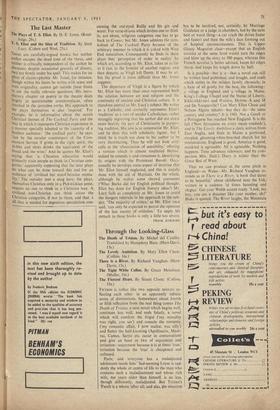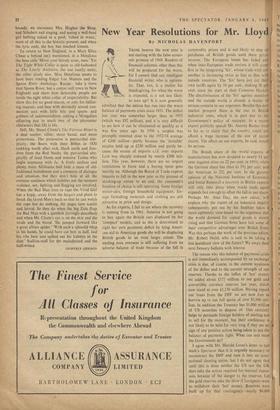• Through the Looking-Glass
FICTION is rather like two opposite mirrors re- flecting each other in an apparently infinite series of diminutions. Somewhere about fourth or fifth reflection from the real thing comes The Death of Tristan, a neat novel which begins well, continues less well, and ends falsely, a novel which will comfort the frigid ('my morality was right, you see') and console the romantic ('rny romantic affair, I now realise, was silly') and flatter the half-knowing (Apollinaire, Maur- ras, Camus, Sartre etc. occur in conversation) and give an hour or two of enjoyment and irritation—enjoyment because it is at times 'true,' irritation because the 'true' is cheapened and softened.
Paris; and 'everyone has a maladjusted adolescent inside him.' Sad-seeming Loyse is sud- denly the whole or centre of life to the man who contains such a maladjustment and whose rich wife, ten years older than himself, is no less, though differently, maladjusted. But Tristan's Yseult is a wbore,'after all; and alas, the situation has to be resolved, not, certainly, by Marriage Guidance or a judge in chambers, but by the next best or worst thing—a car crash (he drives faster and faster) and then the wife's face forming out of hospital unconsciousness. This is Upper Glossy Magazine class—except that an English novelist at the same level would turn the edges and blow up the story to 300 pages, whereas this French novelist is better advised, keeps his edges sharp, and keeps his length down by half.
Is it possible—but it is—that a novel can still he written (and published, and bought, and read)
hich unites in the mildest family chronicle, in a haze of all gently for the best, the following: a village in England and a village in Maine, King's College Chapel and the Statue of Liberty, Rikki-tikki-tavi and Walden, Hymns A. and M and De Toccineville? Can Mary Ellen Chase and Nelson Algren inhabit--but they do—the same century and country? It is 1901. Not a Greek or a Portuguese has reached New England. It is the fall ('New Jerusalem on every mean roadside'), and in The Lovely Ambition a cleric arrives from East Anglia, and finds in Maine a porticoed, steepled. gleaming-white-boarded church for his ministrations. England is good, America is good, mankind is agreeable. All is agreeable. Nothing happens. Time advances sideways; and by com- parison Mrs. Dale's Diary is wilder than the Great Bed of Ware.
That we can produce at the same pitch in England—or Wales—Mr. Richard Vaughan re- minds us in There is a River, 'a book that dares to be beautiful,' about childhood near the Usk, written in a cadence 'at times haunting and elegiac.' Get your Welsh accent ready. 'Look, my boy, you are, a dreamer like your mother, eh'?' Blake is quoted. The River laughs, the Mountain
broods; we encounter Mrs. Hughes the Shop, and Schubert and singing, and seeing a well-bred girl bathing naked in a pool, 'robed in water,' most of all this in the historic present; and when the lyric ends, the boy has reached sixteen.
To return to New England, in a Mary Ellen Chase a behind isn't mentioned, in a Metalious the boss yells 'Move your bloody arses, men.' Yet The Tight White Collar is quite as old-fashioned as The Lovely Ambition, the one nastily nasty, the other nicely nice. Miss Metalious seems to have been reading Edgar Lee Masters and the Spoon Rit+r Anthology. Recipe: take a town (not Spoon River, but a cotton mill town in New England) and show how detestable people are inside the tight white collar of respectability. But show this for no good reason, or only for titillat- ing reasons, and lace with decidedly sexual con- nection and with little bits and spurts and gobbets of sadomasochism, adding a Mongolian offspring just to teach two of the pleasanter characters that life is life.
Still, Mr. Stuart Cloete's The Fiercest Heart is a deal nastier, sillier, more banal, and more pretentious. The pretension is patriarchal sim- plicity, the Boers with their Bibles in 1830 trekking north after rich, black earth and free- dom from the Red Necks, the patriarchal still: plicitly of loud Ooms and massive Tantes who begin sentences with Ia. A lively surface and plenty more Afrikaans half hide a mass of old- fashioned melodrama and a crassness of dialogue and situation, but they don't hide at all the extreme nastiness which bubbles out the moment violence, sex, fighting and flogging are involved. When the Bad Man tries to rape the Vivid Girl (on a kopje, away from the laager) and plans to break the Good Man's back sá that he can watch the rape but do nothing, the pages turn scarlet and lyrical. So they do when the big Zulu flogs the Bad Man with a sjambok (lovingly described) and when Mr. Cloete's eye is on the skin and the weals and the blood. 'He jumped forward like a great albino spider.' With such 'a splendid whip in his hands, he could have cut him in half, laid his ribs bare and spilled out his kidneys in the dust.' Stallion-stuff for thr maladjusted and the half-witted.
GEOFFREY GRIGSON











































 Previous page
Previous page